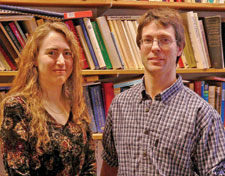Passionate about languages
Linguistics graduate student Annick Morin is a rising scholar
Passion feeds success; just ask Annick Morin, a master’s student who is making a name for herself .
In just the second year of her Special Individualized Program (SIP), Morin’s work on the Gascon language is creating a buzz at international conferences, where she is presenting papers and rubbing shoulders with prominent figures in the field.
“Presenting at conferences is a very exciting experience despite my fear of speaking in public. It’s a unique opportunity to learn and make contacts.”
Morin’s work took her to Toulouse last year for a one-day conference on Occitan linguistics. Over the summer, she presented again at the Center for Advanced Study in Theoretical Linguistics in Tromso, Norway.
Next on the agenda is the Going Romance conference in Holland in December, one of the most important conferences on Romance languages in the world, followed by Queen’s University in June for a conference on French dialects.
“People are used to seeing Concordia’s linguistics program represented at international conferences, since all of our faculty, not just the permanent members, are active researchers,” said Charles Reiss, associate professor in Concordia’s Linguistics program and one of three supervisors of Morin’s SIP.
“I think people will assume that Annick is a member of the teaching staff.”
As an SIP student, Morin had the privilege of designing her own program with the help of a supervisor. To be accepted in such an individualized program, Morin had to write an extensive research proposal. Her unique program, which focuses mainly on theoretical linguistics, is composed of eight courses in phonology, semantics, syntax, cognitive science, formal methods, and field methods.
“Concordia is the only institution at present which can boast a fully integrated program in theoretical and historical linguistics, two major branches that not only co-exist but directly interact. This provides our students with a dual competence not available in much larger programs,” Reiss said
Morin’s thesis is on the syntax of Gascon language, an Occitan dialect mostly spoken in the southwest of France. The language has certain unique yet essential qualities that make it similar to other Romance languages.
“Gascon syntax has a certain property that is fairly unusual,” she said. “This trait provides crucial evidence for the structure of human language in general.”
Besides Gascon, Morin does some research on Québécois, her native language. She is also interested in German, which she speaks fluently, and other Germanic languages, as well as Algonquian languages such as Innu-Aimun, also known as Montagnais.
Morin’s passion has always been clear in her mind, but she resisted going into linguistics initially because others talked her out of it, arguing there were too few jobs. She decided to go into editing and translation instead, but after eight years, she could no longer deny her initial love.
“The obvious factor in Annick’s success is passion,” Reiss said. “She shares with our undergraduates and our faculty a passion not just for the technicalia of linguistic analysis, but also for relating the details to bigger issues in cognitive science.”
“She has an amazing ability to choose well-defined, manageable research topics which nonetheless have broad implications.”
Support for Morin’s work is not only coming from her peers, but from the granting agencies. She recently won a fellowship from SSHRC, the Social Sciences and Humanities Research Council of Canada, and another from the Fonds de recherché sur la société et la culture.
Morin hopes to go to Europe for her PhD. She also wants to teach.
“I had the chance of giving my first lecture recently in Charles’ Phonetics class and I absolutely loved it,” she said. “Linguistics is the great passion of my life, and I consider myself extremely lucky to have the possibility of earning my living with it.”

